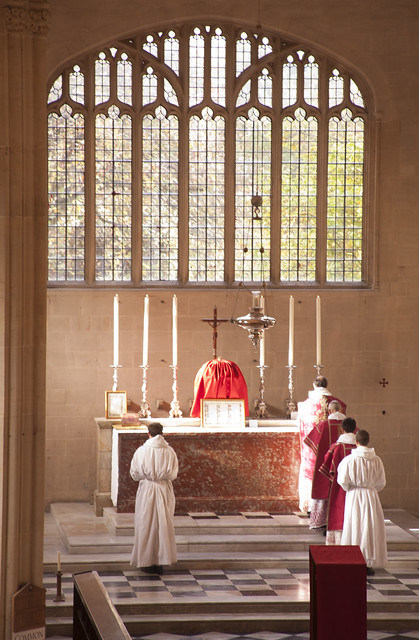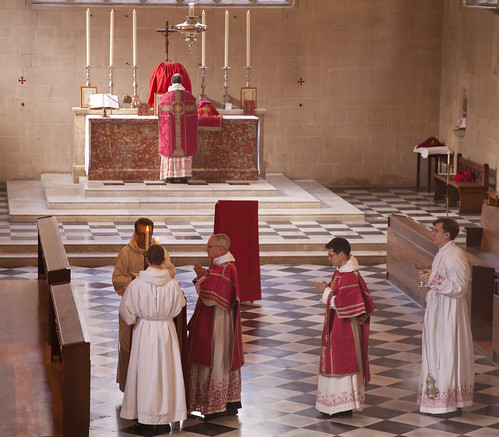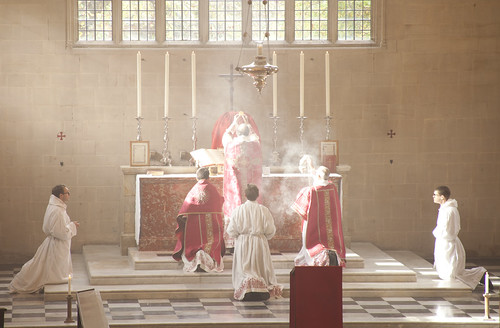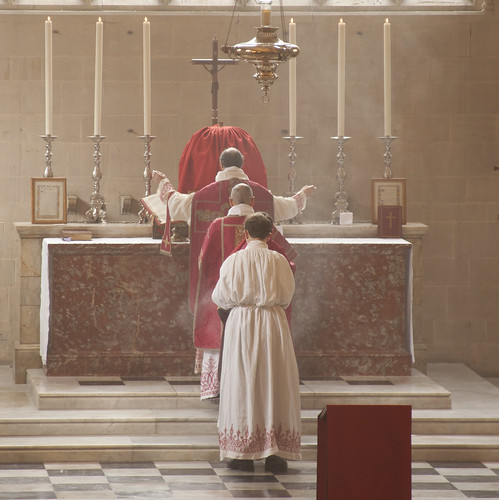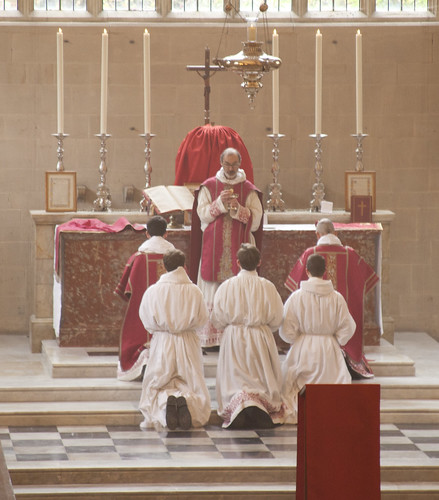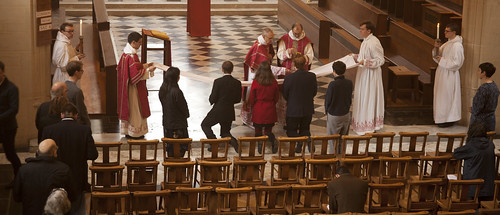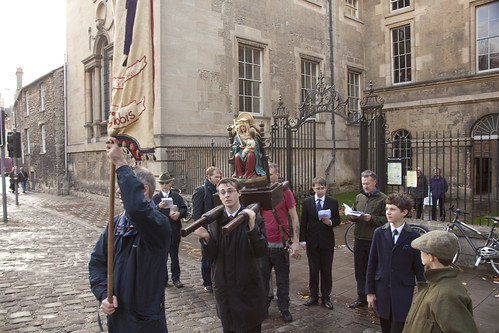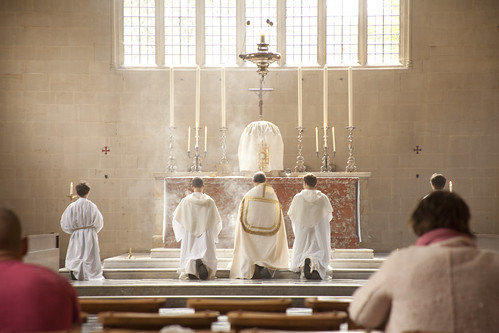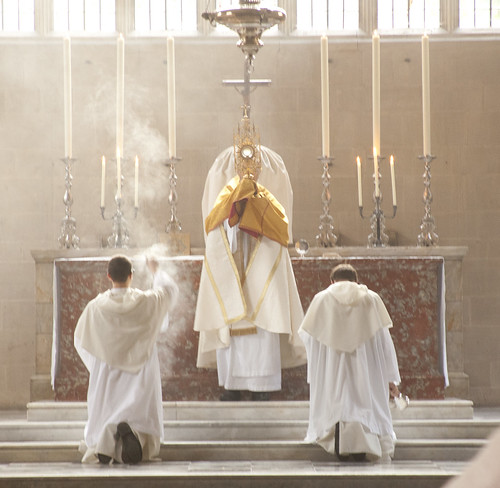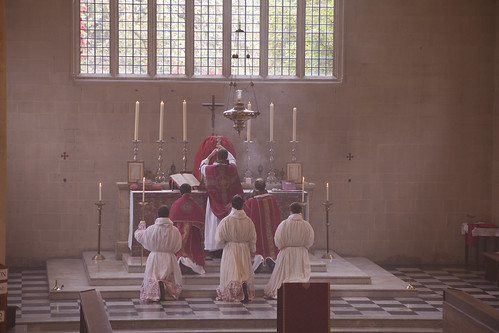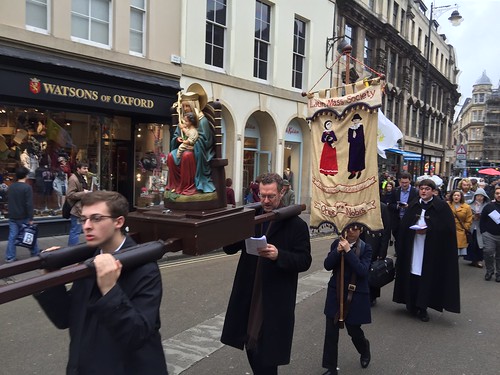Chairman's Blog
The Dominican Rite for the Latin Mass Society in Oxford
Yesterday was the annual LMS Pilgrimage to Oxford in honour of the city's Catholic martyrs. This year we visited the site of the martyrdom of Bl George Napier, the Castle Gallows, where he had his eternal nativity in 1610, after many years of ministering as a priest in his native Oxford, and the surrounding area.
The LMS has for a number of years had this pilgrimage at the Oxford Blackfriars, celebrated by the friars in their own Rite, the ancient Dominican Rite. It is a lot like the ancient Roman Rite, but there are a number of differences which are interesting to see, and it has an austere elegance all of its own.
The Schola Abelis, Oxford Gregorian Chant choir which exists to support celebrations of the traditional liturgy, accompanied the Mass as usual, with Dominican Chant. Just as the rubrics of the Mass are a little (actually, quite a bit) different from the Roman ones, so the chant melodies and the whole feel of the chant is a bit different.
It was an entirely chant Mass, with a Dominican Chant Mass Ordinary to go with the propers.
The changable weather and 'storm Brian' may have contributed to a lower than usual turnout, but the Schola Abelis had the biggest group I think we have ever fielded at a service: fifteen.
A sudden downpour during the procession added to the interest of the occasion, as did our being joined by one of Oxford's ... characters. I'd not normally encourage someone to carry a processional statue while holding in one hand a half-drunk bottle of wine, but he was very attached to the idea and it seemed a pity to discourage him. He assisted at Benediction as well.
The public witness of the procession, and the liturgy, meant something to him. These things have a power which we cannot fully articulate or perceive. The saints in prison managed without the liturgy by a special grace but for the rest of us it is necessary. It is the normal and indispensible food for the soul, to sustain us and to help us grow in the faith.
I know for many Catholics for the last half-century the liturgy has been a trial, a source of suffering. It is no small thing to contribute to a liturgy which is an occasion of light and consolation. The value of the Traditional Mass, in whatever Rite it may be, and the other traditional liturgical acts and devotions, cannot be calculated. Don't allow yourself to miss out on what should be a Catholic's birthright.
Support the work of the LMS by becoming an 'Anniversary Supporter'.
More on Pope Francis and doctrinal development
I've been included in a panel of academics interviewed for LifeSiteNews on the subject of doctrinal development, in light of Pope Francis' remarks on the Death Penalty.
An extract:
Shaw said so-called “conservative” Catholics would be especially susceptible to a change in Catholic teaching on capital punishment.
“Pope St John Paul II was clearly personally opposed to capital punishment and campaigned for its abolition. While he was careful never to claim that the teaching of the Church ruled capital punishment out, his views have become strongly associated with the Catholic Church and have influenced many conservative Catholics,” he said.
“It may seem a relatively small step between what Pope St John Paul II claimed – that capital punishment was not wise or appropriate in the conditions of the modern world – and what Pope Francis is now claiming – that capital punishment is never ‘admissible,’ and that Catholics living in very different conditions from our own were wrong to make recourse to it.”
“However, it is obviously a huge step to say that the Church herself was wrong in her consistent teaching, which has always been that capital punishment can be legitimate,” he added.
Read the whole thing there.
Support the work of the LMS by becoming an 'Anniversary Supporter'.
A friendly warning to Opus Dei
 I don't want to single out Opus Dei; what I have to say is applicable to a number of conservative Catholic organisations. But Opus Dei does rather single out itself.
I don't want to single out Opus Dei; what I have to say is applicable to a number of conservative Catholic organisations. But Opus Dei does rather single out itself.
We had the organisations 'number 2', the Vicar General, Mgr Mariano Fazio, criticising the Filial Correction for 'correcting a father in public':
Any faithful, bishop, cardinal, lay person has the right to tell the pope what he sees fit for the good of the Church. But it seems to me that he has no right to do so publicly and to scandalize the whole Church with these manifestations of disunity.
A number of innovations of a doctrinal nature are to be found in the documents of the Second Vatican Council: on the sacramental nature of the episcopate, on episcopal collegiality, on religious freedom, etc. These innovations in matters concerning faith or morals, not proposed with a definitive act, still require religious submission of intellect and will, even though some of them were and still are the object of controversy with regard to their continuity with earlier magisterial teaching, or their compatibility with the tradition. In the face of such difficulties in understanding the continuity of certain Conciliar Teachings with the tradition, the Catholic attitude, having taken into account the unity of the Magisterium, is to seek a unitive interpretation in which the texts of the Second Vatican Council and the preceding Magisterial documents illuminate each other. Not only should the Second Vatican Council be interpreted in the light of previous Magisterial documents, but also some of these earlier magisterial documents can be understood better in the light of the Second Vatican Council. This is nothing new in the history of the Church. It should be remembered, for example, that the meaning of important concepts adopted in the First Council of Nicaea in the formulation of the Trinitarian and Christological faith (hypóstasis, ousía), were greatly clarified by later Councils.
The problems with this paragraph are many, and I don't want to give his article a detailed critique, so to keep it brief I invite the reader to answer for him or herself the following two questions:
1. Given that Council documents and other official documents contain both statements of the Ordinary Magisterium and other kinds of proposition, such as historical and scientific claims (such as are not inseparably connected with teaching), prudential judgements, and theological speculations, would the loyal Catholic not need to apply his mind first to determining what was actually magisterial in a document before submitting intellect and will to it?
Anyone who thinks that the non-magisterial content of one official document cannot contradict that of another simply needs to read a few. The mutually-contradictory Papal Bulls of the Franciscan property debate would be one place to start.
2. When the meaning of putatively magisterial statements in Council or other official documents are disputed, and where such disputes are themselves legitimate, how is it possible to submit one's intellect and will to them? How can one submit one's intellect to a statement whose meaning one cannot determine?
What seems reasonably clear is that the top two officials of Opus Dei are inviting Catholics to adopt an attitude of pre-emptive intellectual submission towards anything emanating from Rome, without making use of the right - which can also be a duty - to inform our fellow Catholics of their concerns about such emanations. Yes, they say, there can be ambiguities and problems, but obedience of the intellect comes first, acceptance come first, and attempts to smooth over the problems can follow later.
I've been told in comments on this blog, what I already knew, which is that Opus Dei contains many Good People. Of course it does. These are, in fact, among the most good-hearted and faithful Catholics whom one could hope to meet. It is through no lack of charity towards them that I write as a I do: quite the contrary. While I know that what I write will have no effect at all on the leadership of the organisation, I want to warn those who are members, and those associated with the many other organisations which include what we call 'conservative' Catholics, of the dangers of the road you are going down, when you start thinking of obedience as the chief or even the only virtue, instead of humility, justice, courage, charity, and the virtue of faith itself.
One danger, which follows obviously from what I have just said, is a spiritual distortion arising from a failure to recognise and cultivate the full set of virtues. That is something readers will just have to meditate upon. I want to focus on two other dangers.
The first is that it leads into anti-intellectualism. Perhaps this doesn't look like a big deal, but it will destroy the intellectual prestige of your communities and drive out those of your members of an intellectual bent. People with an intellectual formation who are honest will not be able to stick it: it will drive them nuts.
The second problem derives from the fact that when the wind changes direction, the internal policy will follow also. This isn't some uncharitable speculation on my part, it is exactly what Mgr Ocariz is saying. A new Pope, a new policy, and a new document, and all the 'faithful Catholics' who follow his advice will be reading the 'innovation' back into previous documents, submitting their intellects, and tying themselves into knots to say that what they'd previously said was black is actually, now you come to look at it, white. You may think we'll have to wait for a new Pope to see this happening, but no, we can see it happening with the current Pope.
It is a fact, and not a particularly disturbing one in itself, that Papal policy changes. Again, anyone doubting this just needs to do some reading, but a nice example is the maddening succession of policy reversals the Popes made towards the 'Chinese Rites'. Now it may be that such changes of policy require obedience on the basis of the disciplinary authority of the Pope, but anyone living through a period such as that who tries to justify each policy as correct, as in continuity with previous rules, and as based on fundamental magisterial principles, because he does not want to admit that official documents should ever be disagreed with, has got a problem.
He has got, in fact, the problem that the British Communist Party had in and just before the the Second World War. First the Party Line was that the Nazis were evil, as they were persecuting communists in Germany. Then the Party Line was to be neutral in the war against Germany, since the Soviet Union was allied to the Nazis. And then the Party Line was to support the war with Germany, since the Soviet Union was at war with them itself. Each had to be passed off as eternally true for fundamental ideological reasons.
Although in France and Italy the Communists were able to retrieve some self-respect by their resistence to occupation, in Britain the flip-flopping did irreparable damage to the Party's credibility. The same thing is going to happen to any organisation which claims to base itself on objective principles which does repeated 'backflips', to use Cardinal Pell's phrase. To put it bluntly, this will destroy your community.
Am I applying this to Opus Dei? Let me correct that impression. Really, what I have been saying applies to the Catholic Church as a whole over the last half-century. We have all seen it: good-hearted and loyal people twisting themselves into pretzels to make everything seem ok, but other Catholic intellectuals just dropping out of the whole game because it looks incompatible with intellectual self-respect. And yet others, observing all this, concluding that the Church doesn't really stand for anything much any more.
That's a lesson we should learn from. If we don't, we are going to repeat it till we do.
Support the work of the LMS by becoming an 'Anniversary Supporter'.
‘Pro-Pope Francis’ petition launched
V. Let us pray for our holy Father the Pope.
R. The Lord preserve him, and give him life, and make him blessed upon earth, and deliver him not up to the will of his enemies.
Let us pray.
O Almighty and eternal God, have mercy on thy servant Francis, our Pope, and direct him according to thy clemency into the way of everlasting salvation; that he may desire by thy grace those things which are pleasing to thee, and perform them with all his strength. Through Christ our Lord.
R. Amen.
See also the LifeSiteNews report.
Oxford Pilgrimage this Saturday
This Saturday, 21st October, the annual Latin Mass Society Pilgrimage to Oxford will take place.
11am High Mass in the Dominican Rite, Blackfriars, in St Giles, Oxford
2pm Procession to the Castle Gallows, site of the martyrdom of Bl George Napier in 1610
3pm Benediction in Blackfriars
Support the work of the LMS by becoming an 'Anniversary Supporter'.
Ultramontanism's Death Sentence
 |
| Pope Pius XII |
It must be clearly stated that the death penalty is an inhumane measure that, regardless of how it is carried out, abases human dignity. It is per se contrary to the Gospel, because it entails the willful suppression of a human life that never ceases to be sacred in the eyes of its Creator and of which – ultimately – only God is the true judge and guarantor.
Again:
It is necessary, therefore, to reaffirm that no matter how serious the crime that has been committed, the death penalty is inadmissible because it is an attack on the inviolability and the dignity of the person.
Presumably, in 1952 all good Ultramontanists said that, because the Pope had said so, it follows that it is true that the death penalty is not only permissible, but for sufficiently serious crimes, uniquely appropriate. (What else does it mean, to say that a criminal has 'disposed' of his 'right to life'?)
Of Pope Francis' statement, to put it mildly, this cannot be said.
Note: the liceity of capital punishment is the first of the propositions discussed in the Appeal to Cardinals of the 45 Theologians, which gives more references.
Cardinal Dulles gives a thorough account of the teaching of the Church on First Things here.
Support the work of the LMS by becoming an 'Anniversary Supporter'.
Fr Thomas Crean on whether Amoris is 'Thomistic'

LifeSiteNews carries an interview with Fr Thomas Crean OP on the use of St Thomas Aquinas by Amoris laetitia, in light of Christoph, Cardinal Schönborn's claim that the document is 'Thomistic'.
Read the whole thing there; I paste in an extract below.
More serious because more plausible misuse
Read the whole thing on LifeSite.
Support the work of the LMS by becoming an 'Anniversary Supporter'.
The Tablet on the Filial Correction
I said some time ago that the instinct of conventional Catholic ‘progressives’ would be to ignore the Filial Correction. It is the strange new brand of Ultramontanist liberal who is writing article after article and tweet after tweet attacking it. Compare the response of John Allen (report it as briefly as possible alongside two unrelated issues) or PrayTell (pretend it never happened) with that of the likes of Walford, Fastiggi and Goldstein, Fagioli, and Buttiglione (see this blog passim ad nauseam).
The old-style liberals have spent a life-time criticising Ultramontanism, and many — there’ll always be exceptions — have sufficient integrity (or at least shame) not to use the simple fact that it is the Pope this time who is supporting their views as a reason to dismiss objections. Indeed, the present crisis has made it clear that most at least of their long-standing opponents have, contrary to the liberal stereotype, never been robotic Ultramontanists mechanically repeating the Party Line, but are actually motivated by serious theological principles, and are therefore worthy of some degree of respect.
This week’s Tablet, the premier dead-wood media liberal Catholic publication of the English-speaking world, has published a feature article on the Correction and the Dubia by Richard R. Gaillardetz, who rejoices in the title of the Joseph Professor of Catholic Systematic Theology at Boston College. This appears to have the function of filling out and making plausible the sketchy response to the Correction The Tablet's editorial page gives in the same edition -- the editorial refers readers to Gaillardetz.
What we are witnessing today is neither a humble request for doctrinal clarification, nor a stealthily-plotted, mean-spirited assault on the Pope’s integrity. What we are witnessing is the clash of two fundamentally different understandings of how to be a faithful Catholic in the contemporary world and two different understandings of what constitutes the Church’s core mission.
For some, fidelity is ultimately measured more by formal doctrinal assent to the Church’s teaching. These Catholics believe the Church’s mission consists in offering timeless certitudes to a world lost in a sea of relativism. For others, particularly for those who find Pope Francis’ leadership so compelling, fidelity is measured more by the concrete practice of Christian discipleship. For them, the Church’s mission should primarily be directed toward responding to the questions and yearnings of humankind today.
(‘Humankind’: donchalovit?) The implicit claim that taking doctrine seriously is incompatible with ‘discipleship’ and pastoral effectiveness would, I think, have been surprising to everyone of proven discipleship from St Peter to St Maximilian Kolbe via St Francis of Assisi, but let it pass. This is the liberals’ self-understanding. If they admitted to themselves that telling people that they don’t need to be forgiven doesn't often lead them to repentance, there’s no telling what would happen.
What is interesting is that Gaillardetz is not doubting our sincerity or calling for us to be chained up in the Castel San Angelo. He is not saying that we are cruel and wicked people, or even that we victims of pathological rigidity. He seems to be suggesting that we are sincere, consistent, thoughtful, and mistaken.
Over the years The Tablet has been pretty judgemental about those it dislikes. Opposition to females serving at the Traditional Mass, for example, was denounced as misogyny. The Tablet’s opposition to the 2011 translation of the Missal and those who produced or supported it can best be described as ‘spittle-flecked’. Thanks in part no doubt to the change of Editor, when it comes today to a conflict between Ultramontanists who happen to agree with them on matters of substance, and conservatives who do not, The Tablet takes a more eirenic tone. Gaillardetz even calls the former party’s sound and fury ‘manufactured outrage’.
Those pushing the liberalising agenda on Communion for the divorced and remarried may think that Ultramontanism is their strongest card. But actually it cuts two ways. It can be relied on to get the support of senior clergy in Opus Dei, but the liberal Catholic establishment are not riding to their aid. What is even more worrying for them is the fact that, when the official wind starts blowing the other way, as it surely will at some point, Opus Dei spokesmen will without doubt find a way of finessing their position back to orthodoxy. Less flexible partisans of the agenda may find themselves looking rather exposed.
Support the work of the LMS by becoming an 'Anniversary Supporter'.
Claudio Pierantoni answers Buttiglione
Professor Claudio Pierantoni, a signatory of the Filial Correction, addresses in an interview with Diane Montagna on LifeSiteNews the key claims of Rocco Buttiglione when the latter criticised this initiative. Piernatoni know Buttiglione well and the two have corresponded on the subject, so this is of particular interest.
Support the work of the LMS by becoming an 'Anniversary Supporter'.

